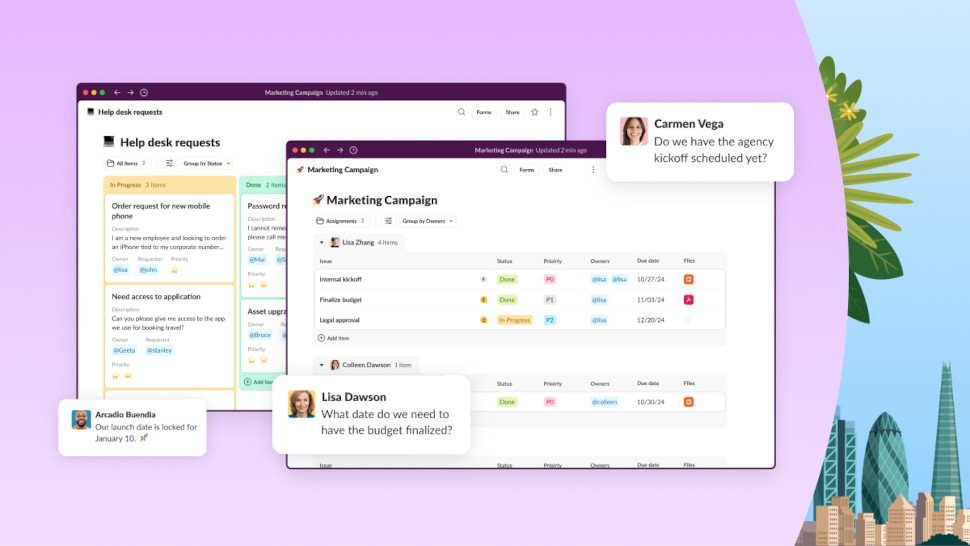
When it comes to harnessing the benefits of AI in the workplace, the gains offered in terms of productivity and efficiency have been a common theme - but what if it could also make your job more enjoyable as well?
Slack has been at the forefront of pushing AI tools and services to users in a bid to free them from the drudgery of menial or time-consuming tasks, particularly through its own Slack AI platform, but can it really make a difference?
TechRadar Pro got the chance to speak to Christina Janzer, SVP, Research & Analytics at Slack at the recent Salesforce World Tour London event to find out more.
Chipping away
Getting the most from AI services is a particularly key concern for Slack, and the company recently released new research showing many workers simply want to use AI to offload some of their most boring and tedious tasks, freeing them up to focus on more creative or enriching work.
Janzer says this isn't too surprising, as getting more enjoyment and satisfaction out of work is a common goal for many of us. Slack's recent research found the vast majority of workers thought AI tools were helping improve productivity, and just under half said they were happy for AI to handle tasks from their job.
She also dismisses claims that AI will completely replace entire job roles, instead noting that such tools could instead be assigned specific tasks - and that each time this happens, workers would have the chance to redesign their job over time to make it more engaging.
“If you are slowly chipping away at the parts of your job that could be automated, or the mundane parts that you can potentially offload to AI," she notes, "it's not only going to make you more productive, but it’s also going to make you happier."
Slack believes it can play a huge part in this re-jigging of work tasks, with the platform's myriad of AI-enable tools helping to cut out menial work, but also spending less time in meetings and helping automate tasks, freeing them up for any number of other more engaging tasks.
"There's so much enablement that still needs to happen...and I think Slack can play a role, not just as a product, but as a thought leader to help navigate these changes," notes Janzer, "when your time is freed by AI, right now the tendency is to do more of the same - and if that's the future, that's a waste, right? We all need to be thinking about, what are some of these more valuable tasks that we could be spending that time on...what could your job really be if you had more time, and what is the value you could bring that you aren't able to bring today?"

Slack's research also found that many executives felt an urgent need to involve AI in their businesses, but Janzer cautions that these leaders need to be fully engaged in the process, not just following the trends.
"If leaders don't put in the work, AI is not going to work," she says, noting that although productivity and efficiency gains are great news, they need to be balanced alongside happy and positive workers.
"It's going to be an incremental process, but if we can engage our employees, and we can encourage them to experiment, and give them a safe space to experiment, I really would hope that in a year from now, our jobs will look much better, we're more productive, and we're also happier."
"We want to make work better - and we can't make work better without really understanding the challenges people are experiencing…and part of making work better is designing a product that can help solve those challenges."
AI urgency?
So looking forward, Janzer is perhaps unsurprisingly optimistic about AI's role in the workplace moving forward, but notes the final use cases do have to help benefit employees.
"We're in such an interesting time," she says, "there’s so much urgency around adopting (AI), executives are feeling really stressed about it, but I don’t think there’s been enough research and conversation around what we can actually do to support our employees."
“We’re at a place where AI improvements are incremental, which is fine…but we need to think bigger - I don't know exactly what that’s going to look like yet, but we’re so stuck in the day-to-day…what does it look for us to think bigger about the role AI could play in the future, what are some big things that we should dream about now, so that we can get ahead of it”
"If we really want to make the most of this new technology, it's not just about the technology itself...we're focused on how we enable employees to really make the most of it so that we can solve some of the challenges that they're experiencing."
"It's going to be an incremental process, but if we can engage our employees, and we can encourage them to experiment, and give them a safe space to experiment, I really would hope that in a year from now, our jobs will look much better, we're more productive, and we're also happier...the potential is so big that if we put in the effort today, it’s going to have huge rewards in the future."







